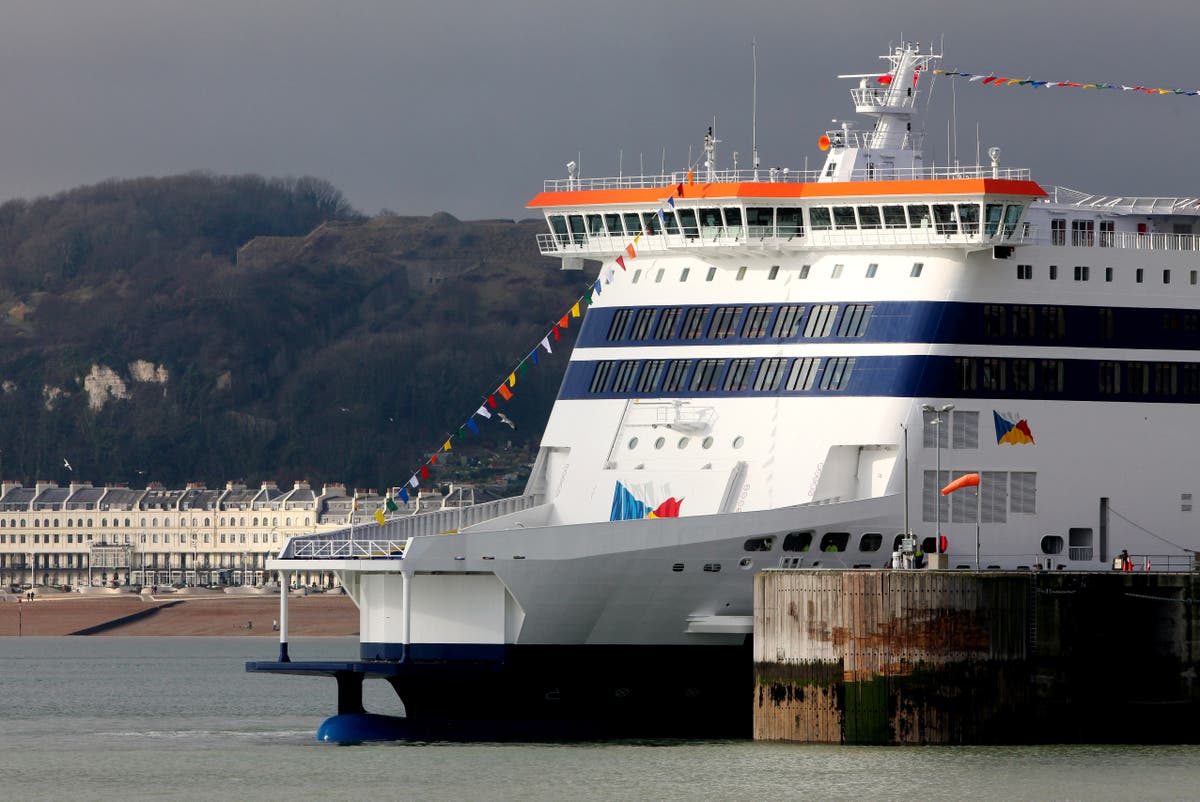Aalborg travel guide: Best things to do and where to stay in Denmark’s rejuvenated northern city
This former industrial hub was best known for its remarkable Viking history, but Joanna Whitehead finds a dynamic Danish city with a new lust for life, from on-trend restaurants to world-class museums and vibrant street art

Sign up to Simon Calder’s free travel email for expert advice and money-saving discounts
Get Simon Calder’s Travel email
With an arresting array of architectural marvels, world-renowned street art and a glittering waterfront, Aalborg is on the ascent. Historically, Denmark’s fourth biggest city and the capital of the North Jutland region was best known for its industry, with shipbuilding and cement production a dominant presence, but a process of regeneration has resulted in a city achieving the almost impossible balance of embracing modernity while paying homage to its rich history. Viking ships once sailed up the Limfjord and ancient burial grounds lie minutes from the city centre, where timber-framed buildings stand firm alongside bold new edifices in steel and concrete.
This compact city is perfect to explore on foot, while the proximity to the wide-open spaces of the North Jutland region are ripe for discovery. A European Commission study found that residents of Aalborg were the happiest in Europe, a feeling you discover when you visit – and with the launch of new flight routes into the city over the summer, now’s the time to explore this evolving hot spot.
Best things to do in Aalborg
Wake with a cold-water dip
A popular spot in the summer months, Vestre Fjordpark is a state-of-the-art recreational area in western Aalborg that includes a large open-air swimming pool, kayaking, canoeing and windsurfing facilities, volleyball and barbecue areas. It’s also absolutely free of charge, making it a great place to start your day.
Vestre Fjordpark is particularly popular on fine summer days
(Kjetil Løite/Visit Denmark)
Read more on Denmark travel:
Take a tour
Aalborg Tours cover many of the city’s popular elements (street art, history, architecture), led by guide Kenneth Pinsker, who is bursting with unusual and lesser-known facts about his home city. Visit an underground museum packed with medieval ruins, a house where women convicted of witchcraft were spotted allegedly engaged in black magic (plus a dungeon where they were subsequently held before death) and learn about a Second World War resistance group composed of local teenagers.
Admire the street art
Aalborg is now renowned as one of Scandinavia’s most important cities for street art, attracting high-calibre artists from all over the world, such as El Mac, Vhils, Martin Ron and Phlegm, to create murals. Since 2014, projects including Out in the Open and WEAART have collaborated with artists to transform grey stone walls into colourful canvases. Follow an interactive guide or take a guided tour to find out the stories behind the images.
Visit a Viking burial ground
Discover one of Denmark’s most important ancient monuments at Lindholm Høje. Located a 12-minute drive from central Aalborg, this remarkable site overlooking the city is the location of 682 graves and 150 stone ships dating back to the Germanic Iron Age and Viking era. Excavated in the 1950s after being covered by a layer of shifting sand up to four metres thick, the extensive site is a remarkable slice of history. It’s free to visit, although a fee is charged at the accompanying museum, which provides further insight into the lives of these early settlers.
Some parts of Lindholm Høje date back to the 5th century
(Joanna Whitehead)
Feel inspired by contemporary art
The remarkable Kunsten Museum of Modern Art is alone worthy of a visit to Aalborg. This beautiful marble building and sculpture garden, designed by the Finnish architect Alvar Aalto, was completed in 1972, and is an attraction in its own right. The museum’s first annual budget was blown entirely on a single work, Pablo Picasso’s Face in a Star, with its custodians continuing to take a bold approach to curation. Exhibitions have included the multimedia works of esteemed feminist artist Kirsten Justesen and Shara Hughes’ joyful, colourful canvases. Don’t leave without trying the sweet treats on offer at the restaurant downstairs.
Best time to visit Aalborg
The summer months of June, July and August are good, with warmer days and sunshine, although prepare for the occasional rain shower – the city’s climate is similar to that of Edinburgh. With cold, windy and rainy weather, January and February are the quietest and cheapest months to visit, while things pick up dramatically by May, when the week-long festivities of the Aalborg Carnival, touted as Europe’s biggest, kick off.
Where to stay in Aalborg
Hotel Comwell Hvide Hus Aalborg
The view from Hotel Comwell Hvide Hus Aalborg
(Joanna Whitehead)
This landmark tower is one of the city’s most established hotels, open since 1969. Don’t be deceived by its age, however; inside is all sleek modernism and stylish workspace pods. Each of the 198 rooms have balconies, with stellar views of the city from the upper floors. Its peaceful location in the leafy Kildeparken is ideal for visitors to Kunsten – and it’s just a 10-minute walk away from the city centre.
Rooms available from{{#price}}{{price}}per night{{/price}}{{^price}}Check availability for dates and prices{{/price}}
{{#amenities}}
Hotel Amenities
Food & Drink
{{#amenities.foodDrink}}{{.}}{{/amenities.foodDrink}}{{/amenities.foodDrink.length}}{{#amenities.internet.length}}Internet
Please check hotel for more information on amenities
Services
{{#amenities.services}}{{.}}{{/amenities.services}}{{/amenities.services.length}}{{#amenities.parking.length}}Parking
Please check hotel for more information on amenities
Health & Wellbeing
{{#amenities.health}}{{.}}{{/amenities.health}}{{/amenities.health.length}}{{/amenities}}
Zleep Hotel Aalborg
Zleep Hotel sits adjacent to both the city’s main railway and bus terminals. This small Danish chain of budget hotels provides clean, comfortable beds and breakfast at a good price, and has bicycles for hire.
Rooms available from{{#price}}{{price}}per night{{/price}}{{^price}}Check availability for dates and prices{{/price}}
{{#amenities}}
Hotel Amenities
Food & Drink
{{#amenities.foodDrink}}{{.}}{{/amenities.foodDrink}}{{/amenities.foodDrink.length}}{{#amenities.internet.length}}Internet
Please check hotel for more information on amenities
Services
{{#amenities.services}}{{.}}{{/amenities.services}}{{/amenities.services.length}}{{#amenities.parking.length}}Parking
Please check hotel for more information on amenities
Health & Wellbeing
{{#amenities.health}}{{.}}{{/amenities.health}}{{/amenities.health.length}}{{/amenities}}
Cabinn Hotel Aalborg
Travellers on a shoestring can bed down for bargain rates at this budget hotel. Centrally located on the city’s vibrant waterfront, it’s also a short walk away from the hedonism of Jomfru Ane Gade, Aalborg’s youth-centric party district, which holds the questionable accolade of being Denmark’s longest street consisting entirely of bars.
Rooms available from{{#price}}{{price}}per night{{/price}}{{^price}}Check availability for dates and prices{{/price}}
{{#amenities}}
Hotel Amenities
Food & Drink
{{#amenities.foodDrink}}{{.}}{{/amenities.foodDrink}}{{/amenities.foodDrink.length}}{{#amenities.internet.length}}Internet
Please check hotel for more information on amenities
Services
{{#amenities.services}}{{.}}{{/amenities.services}}{{/amenities.services.length}}{{#amenities.parking.length}}Parking
Please check hotel for more information on amenities
Health & Wellbeing
{{#amenities.health}}{{.}}{{/amenities.health}}{{/amenities.health.length}}{{/amenities}}
Best cafes and restaurants in Aalborg
This traditional restaurant specialises in one of Denmark’s most beloved culinary traditions: smørrebrød. These open sandwiches consist of a thin layer of sourdough rye bread, known as rugbrød, stacked with a spectacular selection of mouth-watering toppings. Typical toppings include fish, deli meat, pickles and spreads, with the pickled herring smørrebrød a classic. Do as the locals do and opt for a selection to share among friends, washed down with both a beer and a shot of schnapps or aquavit. Hos Isidor Henius is extremely popular, so ensure you book well in advance.
The Danish smørrebrød at Hos Isidor Henius, with roast beef, remoulade, horseradish and crispy onions
(Joanna Whitehead)
With an emphasis on local, sustainable produce, and fish coming from proprietor Emil’s hometown of Strandby, visitors can expect fine-dining standards without the fussiness. The atmosphere is relaxed, staff are warm and knowledgeable, while 1990s hip hop provides the soundtrack. The menu is divided into Little Emil (five snacks and three larger dishes) or Great Emil (five snacks and seven bigger plates), with dishes changing depending on the day’s catch – but expect indulgent and inventive plates built around seafood. Great Emil is generous, especially if opting for the accompanying wine flight, so make sure you arrive hungry.
Located in an old furniture factory, Aalborg Street Food, aka The Lighthouse, is a hub for 16 types of cuisine from around the world. With room for 600 people and harbourside spots to dine al fresco, the space is also host to live music, DJs, flea markets and more.
Best bars in Aalborg
Aalborg Beerwalk
Why have one beer when you can have six? Aalborg’s Beerwalk enables you to enjoy six speciality beers across some of the city’s best pubs at the pace you prefer. Watering holes include Søgaards Bryghus, or Missing Bell Brewpub – a church disguised as a brewery – the John Bull pub – perfect for people-watching with an al fresco tipple in the sunshine – and the cosy, atmospheric medieval Duus Vinkjælder pub. Purchase your ticket at either of the first two pubs, or at Skjold Burne Vine, located at Boulevarden; DKK 159 (£18).
If you’re partial to the grape rather than the grain, pay a visit to Douro Wine Bar. Specialising in Portuguese wine, with one of the bar’s owners residing in the southern European country, it’s home to an excellent selection of wine, and holds regular tasting and tapas nights.
Infamous for being Denmark’s longest street consisting entirely of bars, things get extremely messy here on a weekend. This notorious run is not the place to come for a quiet pint, but if you fancy a spicy night out with a younger crowd, this is where to head.
Best walks
One of Denmark’s most successful regeneration stories of recent years, Aalborg’s waterfront has been transformed over the last decade from an industrial wasteland to a buzzy cultural destination. Recent developments include the Utzon Centre, designed by Jørn Utzon (who created the Sydney Opera House), which celebrates architecture, design and culture, while the steel and concrete shapes of Musikkens Hus, a concert hall, is another architectural wonder. Pass shiny tower blocks accommodating lucky students with some of the best digs in the country as you stroll along the Limfjord – and keep an eye out for seals that live here.
Looking to spend time strolling? Aalborg’s waterfront is the go-to spot
(Mette Johnsen)
Where to shop in Aalborg
Bispensgade and Algade are two of the main shopping streets in Aalborg, featuring well-known clothing, jewellery and electronics retailers, while the Magasin shopping centre is home to popular and designer fashion and beauty brands, such as Marc Jacobs, Acne Studios and Sephora. If it’s a souvenir of Danish design you’re seeking, head to Ulf Bolighus, where you’ll find top quality furniture and homeware to splash your cash on.
How to travel around Aalborg
On foot; one of the attractions of Aalborg is its eminent walkability. Alternatively, many hotels offer bicycle hire to discover the city on two wheels.
Architectural highlights
Kunsten Museum of Modern Art is a white marble edifice with details in redwood, ash, copper and brass, built between 1969 and 1972 by the renowned Finnish architect Alvar Aalto. Large windows display the surrounding trees and sculpture garden and bring light into this marvellous Modernist masterpiece.
Kunsten describes itself as “a living art museum allowing space for immersion, wonder and fascination”
(Destination NORD)
FAQs
What currency do I need?
Danish Krone (DKK)
What language do they speak?
Danish, although a large percentage of Danes (around 86 per cent) speak English fluently.
Should I tip?
It’s not customary to tip in Denmark, but if you have received exceptional service, 10 per cent is considered sufficient.
What’s the time difference?
GMT+1
What’s the average flight time from the UK?
One hour and 40 minutes
What’s the best view?
Built in 1933, Aalborgtårnet is a 54.9m tall observation tower with stellar panoramic views of the city and its surroundings. Ring the bell to take the elevator – the highest outdoor elevator in Northern Europe – to the top and enjoy a bite to eat at the bistro. Note, the tower is closed on windy days.
Insider tip?
Taxis are expensive in Denmark. While Aalborg is the ideal size to explore on two feet (or wheels), if you’re planning on venturing further afield, hiring a car is a good idea.
Read more on the best Denmark hotels

 MikeTyes
MikeTyes 
































